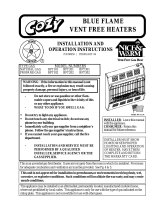
REPLACEMENT PARTSLIST. TO ORDER REPLACEMENT PARTSYOU MUST GIVE MODEL NUMBER, SERIAL
NUMBER, TYPE OF GAS USED, PARTDESCRIPTION AND PARTNUMBER.
MODELNUMBERSNATURAL VFM63 VFM 103 VFM203 VFM303
MODELNUMBERSPROPANE VFM64 VFM 104 VFM204 VFM304
REF, PART LIST PART LIST PART LIST PART LIST
PART DESCRIPTION NO, NO, PRICE NO, PRICE NO, PRICE NO. PRICE
Valve, CPMM-21400/17 1 88290 $40,60 88290 $40,60 88291 $42,00 88177 $41,30
ODS/Pilot (NAT. GAS) 2 88169 $41,90 88169 $41,90 88169 $41,90 88169 $41,90
ODS/Pilot (LP. GAS) 2 88168 $36,20 88168 $36,20 88168 $36,20 88168 $36,20
Manifold 3 88147 $10,10 88148 $20,10 N/A N/A N/A N/A
Manifold "LO" 3a N/A N/A N/A N/A 88155 $18,40 88157 $18,80
Manifold "HI" 3b N/A N/A N/A N/A 88156 $17,90 88159 $18,80
Manifold "MEDIUM" 3c N/A N/A N/A N/A N/A N/A 88158 $18,80
Burner Orifice (NAT. GAS) 5 88021 $3,40 88021 $3,40 88021 $3,40 88021 $3,40
Burner Orifice (LP. GAS) 5 88020 $3,40 88020 $3,40 88020 $3,40 88020 $3,40
Gas Regulator (NAT. GAS) 6 88035 $17,50 88035 $17,50 88031 $17,50 88031 $17,50
Gas Regulator (LP. GAS) 6 88036 $17,50 88036 $17,50 88032 $17,50 88032 $17,50
Burner Assembly 7 88150 $42,20 88151 $79,70 88152 $145,50 88153 $197,40
Gas Supply Tube 9 88045 $2,80 88066 $4,20 88066 $4,20 88049 $4,70
Control Rod 10 88019 $11,70 88019 $11,70 88019 $11,70 88019 $11,70
Control Knob 11 88075 $4,00 88075 $4,00 88008 $5,90 88010 $6,60
Wall Mounting Bracket 12 35220 $7,00 35220 $7,00 35960 $8,60 35960 $8,60
Piezo 13 80016 $5,70 80016 $5,70 80016 $5,70 80016 $5,70
Electrode Wire 30" 14 88070 $2,80 88070 $2,80 88070 $2,80 88070 $2,80
Pilot Tubing Assy,24"Nat,&L,F 15 88013 $4,70 88013 $4,70 88013 $4,70 88013 $4,70
Control Rod Grommet 16 88018 $1,10 88018 $1,10 88018 $1,10 88018 $1,10
Casing Back 17 35165 $16,90 35425 $19,30 35925 $20,00 36425 $25,90
Casing Left Side 18 35060 $13,10 35060 $13,10 35060 $13,10 35060 $13,10
Casing Right Side 19 35070 $13,10 35070 $13,10 35070 $13,10 35070 $13,10
Top Front Panel 20 35045 $14,90 35340 $16,20 35870 $12,70 36340 $21,20
Bottom Front Panel 21 35080 $10,10 35360 $10,70 35860 $12,40 36360 $13,80
Bezel Assembly 22 35100 $43,40 35380 $46,80 35880 $51,70 36380 $58,30
Wire Guard 23 88100 $21,40 88101 $23,00 88105 $26,60 88104 $33,40
Heat Shield 24 35200 $2,60 35460 $2,90 35940 $4,00 36440 $4,60
Valve Support Bracket 25 35185 $2,90 N/A N/A 35185 $2,90 35185 $2,90
Regulator Support Bracket 26 35240 $5,00 35480 $4,00 35240 $5,00 35480 $4,00
Lighting Instruction Assembl 91370 $2,80 91370 $2,80 91371 $2,80 91380 $4,50
BLOWER PARTS VF-B
Blower/Motor Assembly 30 N/A N/A 88250 $58,60 88250 $58,60
Blower Housing 31 N/A N/A 37025 $13,00 37025 $13,00
Fan Switch 32 N/A N/A 88240 $5,90 88240 $5,90
Power Cord 33 N/A N/A 80202 $4,20 80202 $4,20
Junction Box N/A N/A 37075 $6,10 37075 $6,10
Junction Box Cover N/A N/A 37085 $7,80 37085 $7,80
* TWO REQUIRED
I Mr. Contractor, we only sell parts through our wholesalers, but the prices listed above are for your convenience.
|
For prompt parts service, contact the wholesaler fiom which you purchased your Cozy heater. NOTE: Parts & I
schematic drawings on current models are shown at _vw.cozyheaters.com
MARCH 2005
Page 19





















